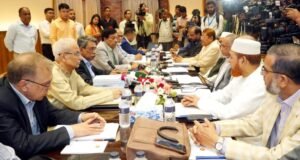 Only eight out of China’s 74 biggest cities passed the government’s basic air quality standards in 2014, the environment ministry has said.The most polluted cities were in north-eastern Hebei, the province that surrounds the capital Beijing.Beijing and Shanghai both failed the assessment, which was based on measurements of major pollutants.China is attempting to cut pollution but the country still relies heavily on coal for its energy needs.The government shut more than 8,000 coal-burning factories in Hebei last year.But the BBC’s Celia Hatton in Beijing says like many places in China, the authorities are struggling to balance factory closures with the demands of the country’s slowing economy.The environment ministry’s statement published on its website (in Chinese) noted that the 2014 result was an improvement over the previous year, where only three cities met the standards.But it added that “presently, the country’s air pollution situation remains serious”.The assessment was based on readings of pollutants such as PM2.5, PM10, nitrogen dioxide, carbon monoxide and ozone.The southern city of Haikou, in Hainan province, was found to have the cleanest air.Most of the eight cities that made the grade were in the east of the country.Meanwhile the northern industrial city of Baoding had the dirtiest air.The statement did not give the rankings for Beijing and Shanghai, although it noted that Beijing’s air quality had improved slightly over the previous year.The Chinese authorities announced a “war on air pollution” last year, and recently began publishing figures for the air quality in China’s cities. Officials have pledged to restrict consumption of coal, scrap millions of cars and rely more on clean energy sources.At November’s Apec summit, China made a historic pledge that its carbon emissions would peak by 2030, but did not set a specific target.It also attempted to improve the air quality in Beijing during the Apec summit, imposing tight limits on car use and ordering factories to close in the weeks leading up to the meeting.The temporary improvement in air quality was termed “Apec Blue”, and the government has since promised to make it a permanent feature by improving air quality countrywide.
Only eight out of China’s 74 biggest cities passed the government’s basic air quality standards in 2014, the environment ministry has said.The most polluted cities were in north-eastern Hebei, the province that surrounds the capital Beijing.Beijing and Shanghai both failed the assessment, which was based on measurements of major pollutants.China is attempting to cut pollution but the country still relies heavily on coal for its energy needs.The government shut more than 8,000 coal-burning factories in Hebei last year.But the BBC’s Celia Hatton in Beijing says like many places in China, the authorities are struggling to balance factory closures with the demands of the country’s slowing economy.The environment ministry’s statement published on its website (in Chinese) noted that the 2014 result was an improvement over the previous year, where only three cities met the standards.But it added that “presently, the country’s air pollution situation remains serious”.The assessment was based on readings of pollutants such as PM2.5, PM10, nitrogen dioxide, carbon monoxide and ozone.The southern city of Haikou, in Hainan province, was found to have the cleanest air.Most of the eight cities that made the grade were in the east of the country.Meanwhile the northern industrial city of Baoding had the dirtiest air.The statement did not give the rankings for Beijing and Shanghai, although it noted that Beijing’s air quality had improved slightly over the previous year.The Chinese authorities announced a “war on air pollution” last year, and recently began publishing figures for the air quality in China’s cities. Officials have pledged to restrict consumption of coal, scrap millions of cars and rely more on clean energy sources.At November’s Apec summit, China made a historic pledge that its carbon emissions would peak by 2030, but did not set a specific target.It also attempted to improve the air quality in Beijing during the Apec summit, imposing tight limits on car use and ordering factories to close in the weeks leading up to the meeting.The temporary improvement in air quality was termed “Apec Blue”, and the government has since promised to make it a permanent feature by improving air quality countrywide.
 Weekly Bangla Mirror | Bangla Mirror, Bangladeshi news in UK, bangla mirror news
Weekly Bangla Mirror | Bangla Mirror, Bangladeshi news in UK, bangla mirror news






